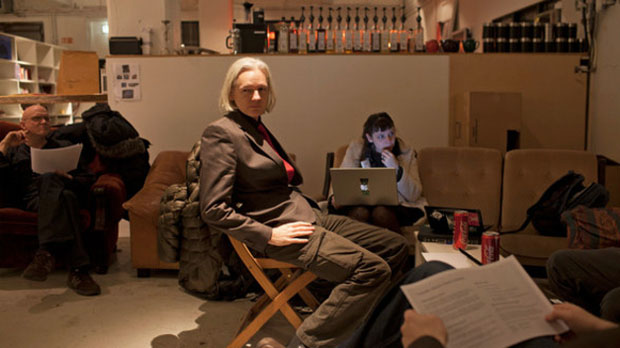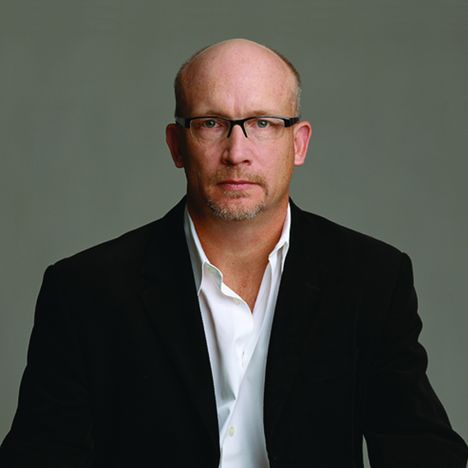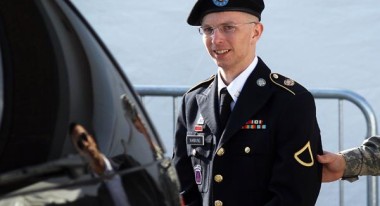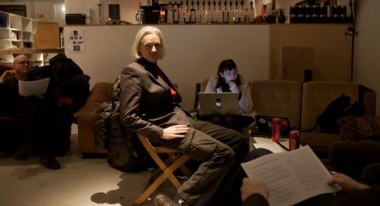 Back to selection
Back to selection
“Lack of Access Made Us More Artful:” Alex Gibney on We Steal Secrets: The Story of WikiLeaks
 We Steal Secrets: The Story of WikiLeaks
We Steal Secrets: The Story of WikiLeaks As a documentary subject, WikiLeaks couldn’t be in better hands than those of Alex Gibney. The Oscar-winning director of Taxi to the Dark Side, whose other films include Enron: The Smartest Guys in the Room and Mea Maxima Culpa, has displayed an ongoing interest in exposing corruptions of power. WikiLeaks, the whistleblower website responsible for the largest leaks of classified documents in history, was founded on the same principle. Yet it is surprising that We Steal Secrets: The Story of WikiLeaks explores the decline of the organization as it became a victim of its own beliefs.
The documentary explores the context in which WikiLeaks was created: in the years after 9/11, when government agencies changed the ways they classified and shared information. It was this situation that allowed the US to surveil its citizens like never before and to invade Iraq without a shred of actionable intelligence. It was this same situation that allowed Army private Bradley Manning to access documents of the abuses his country was committing abroad.
We Steal Secrets parallels the rise of WikiLeaks with the decline of Bradley Manning, an intelligence analyst in Iraq who eventually became WikiLeaks’ most significant source. His findings would eventually comprise a series of leaks that rocked the latter half of 2010. WikiLeaks’ release of The War Logs chronicled failing war efforts in Iraq and Afghanistan, ones that cost more civilian lives than the Pentagon had previously claimed. Its subsequent release of the Embassy Cables contained evidence that the US was using its diplomats for spying, and that its supposed ally, Pakistan, was fueling the Afghan insurgency. We Steal Secrets delves into the key revelations of each of the leaks, but keeps its focus more on the leakers themselves. Gibney pulls off the terrific feat of characterizing both Julian Assange and Bradley Manning without the participation of either one. The reasons for their absence are self-evident for anyone who has been following the story.
Manning has been charged with 22 offenses, including the Espionage Act and the capital offense of aiding the enemy, and his trial has been conducted in almost total secrecy. Julian Assange is currently living in the Ecuadorian Embassy in London, fleeing prosecution for sex allegations by two former WikiLeaks volunteers in Sweden. We Steal Secrets resolves itself in a thorough investigation of these charges. Contrary to Assange’s claims that they constitute an international plot against him, Gibney eventually concludes as to their legitimacy, and perceives them as a part of WikiLeaks’ unraveling.
Filmmaker sat down with Gibney in his office in Manhattan. Our conversation covers his process of working with constraints, the US government’s war on whistleblowers, and more. We Steal Secrets opens in select theaters on May 24 through Focus World.

Filmmaker: You have said that you approached We Steal Secrets as a “David and Goliath story. One man, armed only with a computer, against the world.” That’s not exactly how the film turned out. Was that a midcourse decision?
Gibney: (Laughs) A midcourse correction.
Filmmaker: When did that change in course occur?
Gibney: A couple of things happened along the way. One was, I began to explore the Swedish episode a little bit more, which I initially wasn’t going to explore. But the more people danced around it, the more interested in it I became.
Filmmaker: I think you’re in a minority there. Most of the coverage about Julian Assange seems to subscribe to his idea that it’s an international plot against him.
Gibney: Yes, that it’s a CIA conspiracy — the Americans have manipulated the Swedish government so that if he ever goes to Sweden he’s going to be sent right to Guantanamo. I just don’t buy it. People say it’s so, but I’ve never seen any convincing evidence that it’s so. It doesn’t mean it’s impossible, but there’s just no evidence to support it. And the other thing that was concerning to me was that, very early on, it was Julian more than anyone else who conflated the sex allegations with the transparency agenda. A lot of people within the organization were telling him, “Julian, deal with this as an individual. Say, ‘I’m taking time off to deal with this,’ and then come back to deal with the organization.” Very early on, and very slyly I think, he would say things like, “I’m not saying it’s a honeytrap, I’m not saying it’s not a honeytrap,” i.e. it’s a honeytrap, or it’s likely a honeytrap. You know, all of these veiled allegations that take you immediately to a John Le Carre thriller. So that to me was the beginning of how a truth-teller turns into a liar.
Filmmaker: It kind of plays nicely into your ongoing interest in themes of corruption.
Gibney: Right. “Noble Cause Corruption” is the phrase that James Ball (former WikiLeaks staffer) uses in the movie, and I’ve become a particular fan of that phrase. It’s all about how the end justifies the means. And frankly, we should have known that about Julian from the get go. Because his hacker name, Mendax, which is short for “splendide Mendax”, means “nobly untruthful,” or “noble liar.” It’s like it’s okay to tell a lie, so long as you’re noble.
Filmmaker: If Julian Assange’s denial of the sexual allegations is a lie, do you think he realizes its consequences for WikiLeaks?
Gibney: I’m not sure. The only way we’d know is to ask Julian. Look, let’s just say it’s more noble if the U.S. government is trumping up a salacious sex story than it is if you’ve just behaved badly in a matter of condoms. That’s not such a compelling story for a transparency organization. But the first one looks pretty good! I’m not saying that Julian ever said it in such stark terms. But he clearly did begin to connect the two. [WikiLeaks] said early on that there were going to be dirty tricks, and that this was the first one. All that stuff, as Nick Davies [Guardian journalist who worked with Assange to publish The War Logs] said, became a snowball that started rolling down a hill. And everybody got on board until suddenly you’re seeing, “Free Julian Assange. Free Bradley Manning,” as if they’re the same. They’re not the same. Frankly, Julian has had great due process. And it’s all been in the service of not wanting to be held to account for his actions, which is precisely what WikiLeaks is supposed to do. Hold people to account. So it ended up going right to the heart of the group’s contradictions.
Filmmaker: Julian Assange is one of the characters in the film who begins as a saint and ends up as something way more complex. I, like many people going into this film, didn’t know much about Bradley Manning. I had never read his chats with Adrian Lamo [the man who turned him in], which really convey the troubled, and maybe reckless, state he was in when he leaked the documents to WikiLeaks. Your film isn’t entirely uncritical of Manning, or any of its other main characters. How do you tell a character-driven story in which all of the characters are in some way unreliable?
Gibney: That is a problem, but it becomes the interesting part of the story. It’s about what should be secret and what should not be secret. But it’s also about truth and lies. So if you have characters who are unreliable, then you have to dig a little bit deeper to find out what the truth of the matter is. I do resist the idea that people become mechanical bobbleheads in some kind of political drama where everything is reduced to a kind of mechanical calculus. But in the case of Bradley Manning, his personal story becomes very important. The military tried to marginalize him early on by saying, in effect, that he’s just kind of a whack job, to create some sense of cause and effect. I firmly believe that Manning had strong political convictions. But there’s a mystery at the heart of Bradley Manning story, which is that, having leaked successfully to WikiLeaks, why did he reach out to Adrian Lamo and basically confess all that he had done? On some human level, he needed contact, understanding, affirmation, and he needed to let somebody else know what it was that he had done. And we can presume that Assange wasn’t that interested in listening to him in that regard.

Filmmaker: The nature of the communications between Assange and Manning is vague, yes?
Gibney: It’s vague, and intentionally so because there’s a court case coming up. Of course we don’t know for sure that Bradley Manning was communicating with Assange when he was communicating with WikiLeaks. But Manning says that he was. He says that he had a relationship with Assange, and that he was talking to Assange. So we have to take Manning at his word. Also, based on what Manning has said in his courtroom statement, we now know that he invested more in the relationship than Assange did. And that gets to the heart of what the source/journalist or source/publisher relationship is all about. It turns out it’s not so mechanical. It turns out it’s a human transaction based on a level of trust.
Filmmaker: That complex relationship finds its counterpoint in the relationship between Julian Assange and the newspapers who helped publish his largest leaks. After the backlash against WikiLeaks following the release of the War Logs, the newspapers — The New York Times specifically — started to distance itself from WikiLeaks.
Gibney: Yeah, The New York Times said that Julian Assange was a source, and in that sense they were trying to distance themselves from him as a publisher. I think that since then, Bill Keller (editor of The New York Times) and Alan Rusbridger (editor of The Guardian) have come out and said if Julian Assange or WikiLeaks were to be charged with the Espionage Act, they would stand shoulder to shoulder with him, saying that he is in fact a publisher, or should be regarded as such. But at the time, Keller was definitely using the word source.
Filmmaker: It’s a relief to hear that, since the charges against Assange and Manning do concern investigative reporting in general.
Gibney: Totally! And a lot of what’s going on, particularly with the Manning trial, is a way of criminalizing leaks and criminalizing the work that newspapers do as a kind of pressure valve, or release value, when governments keep far too much that’s secret. There’s a lot at stake in this trial. I mean, they’re charging Manning with aiding the enemy, which is a capital offense. The prosecution has said that they won’t seek the death penalty, but the judge has a right to impose it. We now know that the judge asked one of the prosecutors if there would have been any difference if Manning had leaked to The New York Times instead of WikiLeaks, and he said no. Okay, so that means that from now on anybody who leaks classified documents can be put to death. That’s pretty profound. And it’s all the more interesting in that we now regard Daniel Ellsberg as a hero. Right? He leaked materials that were at a much higher classification level than what Bradley Manning leaked.
Filmmaker: Hopefully Bradley Manning will be regarded the same. That remains to be seen… In addition to being a human story about Julian Assange and Bradley Manning, We Steal Secrets is about the WikiLeaks revelations. The War Logs, their content, the realities of the wars in Iraq and Afghanistan. It must have been pretty challenging for you to balance between exploring the leaks and the act of leaking itself. Each of the leaks could merit its own series of films, and I’m sure that the part of you that directed Taxi to the Dark Side was tempted to go there.
Gibney: Well we did go there. We had a three and a half hour cut! We delved into the leaks in much greater detail. But there was just no way to sustain that. It seemed to me that, what was valuable and important about this film was to put the story of making those leaks in the context. So you’d see it as one narrative that you could grasp, and if you wanted to go deeper into any of the particular stories of course you could do that.
Filmmaker: The challenge in doing that, of course, is the raw nature of the WikiLeaks site. It takes someone very interested in finding out the information to successfully navigate the site.
Gibney: Yeah, it’s hard work. And I think that’s one thing that WikiLeaks doesn’t appreciate about mainstream journalism. It turns out that telling stories is important, because people are busy. Because people need to have stuff flagged and contextualized for them.
Filmmaker: Which I think The Guardian and The New York Times did so well. They did so much to put the leaks into a context that was accessible and therefore more powerful.
Gibney: I agree. There was a great opportunity there to have the best of both worlds. If that momentary alliance hadn’t blown apart, one could imagine that there would be more anonymous leaks, perhaps on WikiLeaks, that might be published — with redactions, one would hope — which would then be mined and contextualized by some of these mainstream media, and people would be free to go to the hard data themselves.
Filmmaker: How did you go about making the film without the participation of your main subjects?
Gibney: There’s a great phrase by Andre Gíde: “Art is born of constraint and dies of freedom.” So in that sense the lack of access made us more artful than we might otherwise have been. I still regret not getting an interview with Julian, though I joked — with him, in fact — that “I may be the only person in the world who doesn’t have an interview with you!” I think he likes to believe that he’s the puppet master, and that when he gives an interview it’s an indication that he approves of the interview. As if that’s meaningful. Look, let’s flip it around and I say, I was never granted an interview with the Pope or anyone in the Vatican for my film about clerical sex abuse [Mea Maxima Culpa]. Does that mean it’s illegitimate because the Catholic Church didn’t anoint it with their approval? No. So it’s a fundamental misunderstanding. […] Whenever you’re stopped, it always leads you some place interesting.

Filmmaker: One place it leads you is the Internet. The film explores the Internet as a tool of both liberation and oppression. WikiLeaks uses the Internet to expose abuse; the government uses the internet to surveil us, ostensibly to keep us safe. But the film leaves us wondering whether the actions the government have taken since 9/11 to keep us safe have indeed made us safer.
Gibney: I think that we do want our government to help keep us safe. But the question is are they proceeding along those lines? Have we created what Hunter S. Thompson called a “Kingdom of Fear,” where the government has assumed all these powers and they themselves are not being held to account? In some ways this whole film is about how people are not being held to account: Assange is not being held to account for what went on in Sweden; the U.S. government is not being held to account for its enormous amount of secrecy, and the way in which it outrageously punishes those who make secrets public that probably shouldn’t be secret to begin with. Yeah, we need to be safe, but there always need to be checks and balances. And increasingly, there aren’t. I mean, every phone call and every email is now being sucked up into a giant net, so government agencies can go in and investigate when they need to using keywords and other kinds of things. What if one administration decides to use that for slightly political purposes? To say, find out about sexual infidelities of a particular senator or congressman, a defense secretary, or the head of the CIA? The point is that there’s a danger here, and the danger is that we’re sliding into a kind of soft tyranny.
Filmmaker: One of Julian Assange’s earliest lines about WikiLeaks is, “We want to crack the world open and let it flower into something new.”
Gibney: That’s right after he says, “We’re going to fuck them all!”
Filmmaker: (Laughs) Yes. But the world that has emerged after the leaks is far from the one that Julian probably envisioned. Do you think that this is perhaps a precursor to the one that he hoped to bring about?
Gibney: There are always unintended consequences. And the fact is that democracy, or a better world, is always incumbent on all of us to remain vigilant at all times. It’s a never-ending process. There’s no idealized state, you just have to keep trying to find that proper balance between everyone’s need to know and everyone’s need to keep secrets. For a long time, Julian was touting how WikiLeaks caused the Arab Spring, which I think is a gross overstatement. There’s no doubt that the WikiLeaks revelations did accelerate the Arab Spring in some way. But the Arab Spring now is a mixed bag. When Egypt flowered into something new it was also something old. It flowered into something old in a new bottle.
So it’s a process. And I guess that’s the other thing that I came to reckon with in this film: Julian wanted to present the leaking mechanism as a kind of mechanical process, this electronic dropbox. It turns out it’s much messier than that, and properly messy. I don’t think it ever should be mechanical. People should reckon with whether something should be secret, and what consequences there are to exposing secrets, and what kind of protections you need to offer sources who are coming forward in very difficult circumstances. So it raises a lot of uncomfortable questions that we need to keep reckoning with, because if we don’t then we’re fucked.
